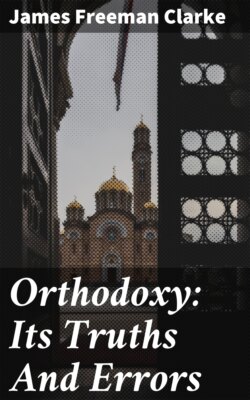Читать книгу Orthodoxy: Its Truths And Errors - James Freeman Clarke - Страница 40
На сайте Литреса книга снята с продажи.
§ 1. Subject of this Chapter. Three Views concerning the Bible.
ОглавлениеTable of Contents
The subject of this chapter is the Orthodox idea concerning the inspiration and authority of the Bible. We shall consider the conflict of opinion between those who believe in the full inspiration of every word of Scripture, and those who treat it like a common book, and endeavor to see how far we ought to believe a fact or a doctrine, because it is asserted, or seems to be asserted, by some writer in the Bible.
Such questions are certainly of great importance to us all at the present time, when opinions on these subjects are unsettled, and few people know exactly what to believe. Especially in regard to the Old Testament, not many persons have any distinct notions. They do not know what is its inspiration or its authority; they do not know whether they are to believe the account of the creation and of the deluge in the book of Genesis, in opposition to the geologists, or believe the geologists, in opposition to Genesis. Certainly it is desirable, if we can, to have some clear and distinct opinions on these points.
And, first, in regard to Inspiration: there are three main and leading views of the inspiration of the Bible. There cannot be a fourth. There may be modifications of these, but nothing essentially different. These three views are—
(a.) Plenary Inspiration.—That is, that everything in [pg 088] the Bible is the word of God. All the canonical books are inspired by God, so as to make them infallible guides to faith and practice. Every word which really belongs to these books is God's truth, and to be received without question as truth, no matter how much it may seem opposed to reason, to the facts of nature, to common sense, and common morality.
This is the Orthodox theory even at the present time. Any variation from this is considered a deviation into heresy. No doubt, in practice it is deviated from, by very Orthodox people; but all Protestant sects, claiming to be Orthodox, profess to hold to the plenary inspiration of the Bible.
(b.) The Rationalist or Naturalistic View of the Bible.—The Bible is not inspired at all, or at least in no way differing from any other book. Its authors were inspired, perhaps, just as Homer, or Thucydides, or Cicero were inspired, but not differently. It has no authority, therefore, over any other book, and is just as liable to be in error as any other. If you should bind in one volume the histories of Herodotus, Tacitus, Gibbon, and Mr. Bancroft, the poems of Horace, Hafiz, and Dante, and the letters of Cicero and Horace Walpole, this collection would have to the Naturalist just as much authority as the Bible.
(c.) The mediatorial view of the Bible, or the view which mediates between the others. This view endeavors to reconcile the others, by accepting the truths in each, and eliminating their errors or defects.
To this third division of opinions belong those of a large class, who are not prepared to accept either the first or the second. They cannot believe every word in the Bible to be the word of God, for they find things in it contradicting the evidence of history and the intuitions of reason, and also contradicting other teachings of the same book. They cannot see why, as Christians, they should believe everything in the Jewish Scriptures. As Christians, they go to the New Testament [pg 089] as a main source of faith and practice, but do not see why they should go to the Old Testament for Christian truth. On the other hand, they cannot look upon the Bible as a common book. They remember that it has been a light to the world for thousands of years, that it has been the means of awakening the human intellect and heart, of reforming society, and purifying life. Even in the Old Testament they find the noblest truth and the tenderest piety. The Bible has been the litany, prayer-book, inspirer, comforter of nations and centuries. They cannot and would not emancipate themselves from the traditions in which they were born, nor cut off history behind them. The Christian Church is their mother; she has taught them out of this book to know God, and out of this book to pray to him, and they cannot regard it without a certain prepossession.
To this third class I myself belong. I would not be unjust to the past or to the future. I would be loyal to truth, and not shut my eyes to what God reveals which is new; and I would not be unfaithful to what has already been taught me, or ungrateful for the love which has taught the world by the mouths of past prophets and apostles.
